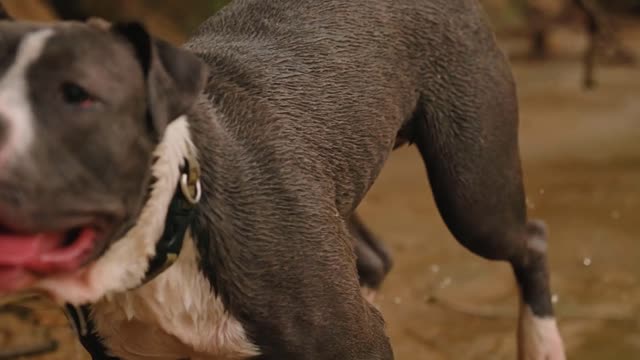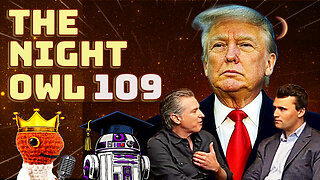Premium Only Content

Why dogs and humans love each other more than anyone else.
Why dogs and humans love each other more than anyone else.
You speak dog better than you think. You may not be fluent; that would require actually being a dog. But if you were to live in a world of only dogs, you would be very good at understanding what they are saying. You can distinguish a nervous bark from a threatening growl, a bark that says hello from a bark that says get lost . You can read body language that says happy, that says sad, that says tired, that says scared, that says Please, please, please play with me now!
You think that's no big deal? Then answer: What does a happy bird look like? A sad lion? You don't know, but dog talk you can. And as with your first human language, you didn't even have to try to learn it. You grew up in a world where dogs are everywhere, and you just understood them.
That in itself says something about the bond that humans and dogs share. We live with cats, work with horses, hire cows for their milk and chickens for their eggs, and pay them with food - unless we kill them and eat them. Our lives are entangled with those of other species, but we could untangle ourselves if we wanted to.
With dogs, things are different. Our world and their world spun together long ago like two different shades of paint. Once you have reached a mixed orange, you will never go back to red and yellow.
But why is that? It is not enough to say that the relationship is symbiotic - that dogs hunt for us and herd for us and we keep them warm and fed in return. Sharks and remora fish made a similar symbiotic arrangement, with the remora cleaning parasites from the shark's skin and getting to help itself to the remains of the shark's kills as payment. This underwater agreement is entirely transactional; love plays no role. Humans and dogs, by contrast, adore each other.
The relationship began - well, no one knows exactly when it began. The earliest remains of humans and dogs buried together date back 14,000 years, but there are some unconfirmed finds that claim to be more than twice that age. The larger point is the significance of the findings: we lived with dogs and then chose to be buried with them. Imagine that.
It was only by a small genetic chance that our inter-species union was forged. Dogs and wolves share 99.9 percent of their mitochondrial DNA - the DNA that is passed on only through the mother - which makes the two species almost indistinguishable. But in other parts of the genome, there are a few genetic fragments that make a powerful difference. On chromosome six in particular, the researchers discovered three genes that encode hyper-sociability - and they are in the same place as similar genes linked to similar sweetness in humans.
Our ancestors didn't know what the genes were many millennia ago, but they did know that every once in a while one or two of the medium-sized scavengers with long snouts that came sniffing around their campfires would look at them with a certain attention, a certain loving neediness, and that it was terribly hard to resist them. So they took in those few from the cold and eventually began to call them dogs, while the close relatives of the animals that didn't pull the good genes - those we would call wolves or jackals or coyotes or dingoes - would be left to make their way in the state of nature in which they were born.
When humans themselves left the state of nature, our alliance with dogs might as well have been dissolved. If you didn't need a working dog - and fewer and fewer people did - the ledger became out of balance. We continued to pay the dogs their wages for food and shelter, but received little that was tangible in return. No matter, though; by then we were in love.
Our language reflected how drunk we were on love: the word "puppy" is believed to have been adapted from the French poupée , or doll - an object in which we lavished irrational affection. Our folk stories were populated by dogs: the Africans spoke of Rukuba, the dog who brought us fire; the Welsh told the story of the faithful dog Gelert, who saved a prince's baby from a wolf. Aristocrats began to include the family dog in family portraits. Wealthy eccentrics began to include dogs in their wills.
Today, at least in areas inhabited by humans, dogs are the most abundant land carnivore on the planet. There are about 900 million of them worldwide, of which only 80 million live in the USA. The single species that is the domestic dog - Canis lupus familiaris - has been subdivided into hundreds of breeds, selected for size, temperament, color, or cuteness.
What began as a contract of mutual services between two very different species has become something much more akin to love.
-
 0:15
0:15
Justyn2022
2 years agoThey love each other
89 -
 14:58
14:58
BEK TV
1 day agoDUNSEITH DECLASSIFIED: UNRAVELING THE EXPLOSIVE TRUTH BEHIND A MINOT MURDER AND A SCANDAL!
3.2K -
 3:28:45
3:28:45
Price of Reason
14 hours agoTrump DELAYS Tariffs With Mexico! Mickey 17 Review! Gavin Newson Hosts Charlie Kirk! GTA6 EXPENSIVE!
41.3K12 -
 2:43:35
2:43:35
TimcastIRL
10 hours agoDemocrats SHUT DOWN Congress Blocking Censure Of Al Green, OBSTRUCT House w/Joe Redden | Timcast IRL
159K74 -
 1:03:27
1:03:27
Glenn Greenwald
13 hours agoUK Pressures Apple to Break Encryption in Major Privacy Clash; How Dems Can Win Back the Working Class: With Former Bernie Sanders Campaign Manager Faiz Shakir | SYSTEM UPDATE #419
93K92 -
 47:39
47:39
Michael Franzese
12 hours agoJewelry King Trax NYC EXPOSES How the Powerful Steal from You
92.5K14 -
 2:36:02
2:36:02
Slightly Offensive
11 hours ago $23.46 earnedCandace REDPILLS the Masses in BOMBSHELL Theo Von Interview | Guest: Shane Cashman
70.1K38 -
 2:29:20
2:29:20
DLDAfterDark
8 hours ago $6.71 earnedDLD Live! That Sh... Will Get You K***ed! What To Consider in SHTF
42K4 -
 2:15:08
2:15:08
megimu32
11 hours agoON THE SUBJECT: IRL Streamers Attacked & Nostalgic Animal Movies That Made Us Cry
72.9K5 -
 1:00:54
1:00:54
The Tom Renz Show
15 hours agoMore Epstein/FBI, a Scary Trade War, & the Dem Echo Chamber
58K11